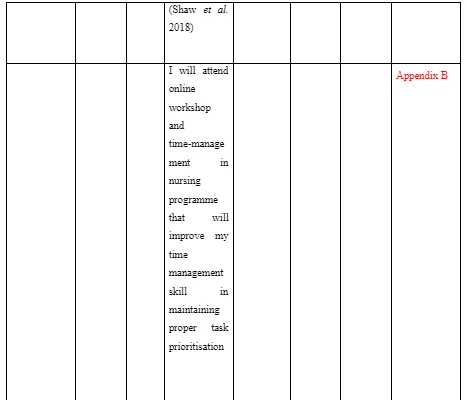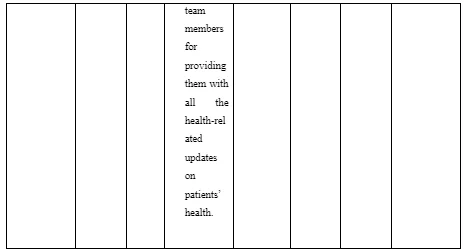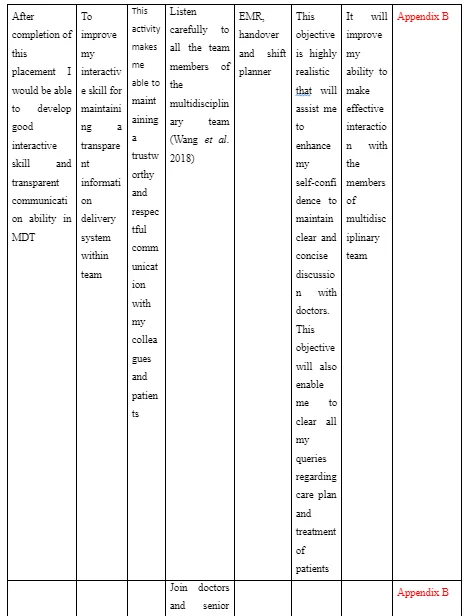Developing Nursing Skills through PLP
Introduction
Nurses must pass through the lifelong learning process throughout their clinical practice. A well-organized professional learning plan (PLP) assists registered nurses to shape their existing skill and develop new nursing skills that promote their professional and personal development (Baldwin et al. 2017). This assignment will reflect on two learning goals that are important for the registered nurses to improve professional expertise and nursing skill. Then the assignment will present an action plan for developing SMART objectives for achieving these two learning goals. Finally, this assignment will discuss the learning log in which it reflects on how the action plan assists the registered nurse to meet learning needs and what strategies can be implemented into the clinical practice to improve the skill and abilities of registered nurses.
Learning goals: By the end of NUR5004 clinical placements, I would be able to develop two goals as below-
Goal 1: Developing time management skill for conducting effective task prioritisation:
Under standard 5 of Nursing and Midwifery Board of Australia (NMBA), registered nurses must develop strong time management skill in terms of prioritising task according to their deadline (Page et al. 2020). Newly graduate nurses must pass through proper training and learning processes for improving their time management skill that will enable them to set appropriate time period for performing each task. This is because effective time management skill enables graduate nurses to divide task based on their priority and urgency. Through developing effective time management skill, newly graduate nurses can accomplish the priority task first and then go to the others task (Williams, 2019). There are important strategies that can improve time-management skills are organisation, prioritization, and delegation. Evidences suggest that, nurses who are newly graduate do not have strong time management skill therefore they are unable to arrange the task based on the prioritisation. Prioritization is based on Maslow’s hierarchy of needs and activities are viewed in terms of importance and urgency, are based on critical thinking and clinical decision-making skills (Aggar et al., 2017; Maryniak, 2019)

I personally think that I need to develop strong time management skill and task prioritisation ability, this is because I faced severe difficulties while working on more then three tasks in each day due to my lack of time management skill which make me unable to maintain perfect balance between the task delivery. I feel that, in most of time I was unable to prioritise the task based on their urgency which made me to every time miss the deadlines that not only interfered with my professional accountability as well as integrity but also interfere with my ability to provide the safe and high-quality care to patients. According to me it is crucial to develop effective time management skill in terms of delivering each task based on their importance and urgency. In my clinical practice, I faced difficulties in arranging task based on their priority due to my lack of time management skill. This is why in most of the time I could not cope up with the consecutive deadline of task which make unnecessary delays in accomplishing each task. RN must have good understanding on how much time needed for each task based in its priority (Baldwin et al. 2017). In my clinical practice I had to deal with manifold tasks such as observing patient’s physical health on regular wise, check all the biological parameter of patients, communicate with patient on health needs and pains and check the process of effective medicines management for ensuring patient safety (Williams, 2019). Due to severe workload and poor time management ability, I often was unable to manage perfect balance among all these tasks which interfered with my professional accountability an integrity. During my daily shift I did not get that enough opportunities to discuss the issues of my poor time management skill with my mentors and colleagues, this is due to the busy schedule of every nursing staffs in the team in which I work (Green and Huntington, 2017). Despite working hard on developing time management skill for maintaining effective task prioritisation, I need to undertake professional training and valuable guidance from my mentors and senior nursing professionals to find out areas of weakness and strength.
Goal: 2 Interprofessional Communication with multidisciplinary team.
Under standard 2 of Nursing and Midwifery Board of Australia (NMBA) registered nurses (RN) must have strong interprofessional communication skill while working in multidisciplinary team (NMBA, 2018). New graduate nurses must develop an effective interprofessional communication skills that will enable them to maintain a transparent communication with patients, senior nurses, doctors, specialised health professional, health and social care staff and officials of healthcare authority. In case of graduate nurses, it is crucial to develop strong interprofessional communication skill which will enable them to maintain the transparent and effective communication with all the members of the multidisciplinary team (MDT) (Williams, 2019). In modern nursing field, nurses have to work in the MDT for taking holistic approach and person-centred care process for determining complex health needs of patients. In this context, a newly graduate nurses must develop good interprofessional communication skill that is essential for communicating with doctors, and other senior nursing professionals and healthcare staffs regarding patient’s health status. On the other hand, interprofessional communication is crucial for newly graduate nurses while working in the MDT to maintain synergistic and collaboratives relationship with all the members of team that improve overall care delivery process. Developing an effective interprofessional communication skill is important for me to work collaboratively and synergistically in a multidisciplinary team (McInnes et al. 2019). I personally think that, I needs to develop strong interprofessional communication skill while working in the MDT. This is because many times I face difficulties in maintaining transparent and effective communication with team members in MDT due to my poor interactive ability and verbal communication skill. While reporting the regular health status of patients to the senior nurses and the doctors I often feel nervous and lack of self-confidences which make me unable to clearly discussion all the information to the health professionals. On the other hand, I realised that due to my poor interactive and interprofessional communication skill, my team members ad sensor nursing professional avoid me while conducting any official meeting or conference regarding patient’s health related issues or treatment (Chen et al. 2019). During my clinical placements, I tried to put my best effort in providing the clear and concise information regarding health-related updates on patient’s health, treatment, medication and case report. I need to improve the grammatical knowledge and sentences formation skill which will enable me to improve my written communication skill thereby making me able to make a clear and understandable case report and drug chart for patients. Take a deeper dive into The Experience of Young Arabic Learners in a British Context with our additional resources.
Action plan:







Learning log:
Here I am going to use Gibbs reflective cycles to discuss the learning log that I have developed for undertaking the pre-set activities for achieving the above-mentioned goals. For undertaking the activities that are set under the above-mentioned gaols, I used time planner and online time setter to accomplish each task before its deadlines such as making health report of each patient, developing patient’s case study, checking the drug chart and inspecting ongoing medication. I also read online books, articles and magazines on time-management in nursing practices. I tried to develop time scale for dividing the entire job schedule into the important and unimportant task. I also used the rating system to rate the task based on the urgency and importance. After performing all the activities, I am able to develop good time management skill. I used to attend the regular official conferences and meeting with multidisciplinary team members in which I took good initiatives on discussing patients’ health related issues and treatment. Additionally, I also joined doctors and senior nurses while they are communicating patients’ drug chart, medication and treatment as well as care plan (Scammell et al. 2020). I tried to listen carefully to all the team members in the multidisciplinary team and then discuss all my questions regarding the allocated task. During undertaking all these activities to achieve the abovementioned objectives I personally feel that I needed to be more involved in all the task that I was doing throughout the training process. I also feel that I needed to work more closely with my seniors and colleagues which could enable me to develop my communication skill, teamwork ability, interactive ability and analysing skill that are important for newly graduate nurses to improve their overall professional standard. By evaluating and analysing all the experiences that I gathered throughout the placement I can say that the placement brought about several learning opportunities for me. Throughout the training process I was able to develop good communication skill. I was able to develop good time management skill and task prioritisation skill. the placement was highly informative to me that made me learn about how to arrange all the tasks systematically and then work the urgent task based on their priority. I understood how to make an effective verbal and written communication while working in the multidisciplinary team. I also learned to maintain the professional behaviour and activities in term of maintaining transparent information delivery system within the team. In the action plan I want to improve my written communication skill, analysing ability, critical thinking skill and the resilience ability which are associated with providing the high quality and safe care to patients and improve my professional standard.

Conclusion:
From the abovementioned discussion, lifelong learning is crucial for registered nurses which enables them to develop good professional and personal skill through the clinical practices registered nurses pass through several learning processes that shape their existing skill and develop new skills in them.
Reference list:
Baldwin, A., Mills, J., Birks, M. and Budden, L., 2017. Reconciling professional identity: A grounded theory of nurse academics' role modelling for undergraduate students. Nurse Education Today, 59, pp.1-5.
Casey, M., Cooney, A., O'Connell, R., Hegarty, J.M., Brady, A.M., O'Reilly, P., Kennedy, C., Heffernan, E., Fealy, G., McNamara, M. and O'Connor, L., 2017. Nurses', midwives' and key stakeholders' experiences and perceptions on requirements to demonstrate the maintenance of professional competence. Journal of advanced nursing, 73(3), pp.653-664.
Goode, C.J., Glassman, K.S., Ponte, P.R., Krugman, M. and Peterman, T., 2018. Requiring a nurse residency for newly licensed registered nurses. Nursing outlook, 66(3), pp.329-332.
Karbasi, C., Pacheco, E., Bull, C., Evanson, A. and Chaboyer, W., 2018. Registered nurses' provision of end-of-life care to hospitalised adults: A mixed studies review. Nurse education today, 71, pp.60-74.
McInnes, S., Halcomb, E., Huckel, K. and Ashley, C., 2019. Experiences of registered nurses in a general practice-based new graduate program: a qualitative study. Australian journal of primary health, 25(4), pp.366-373.
Murray, M., Sundin, D. and Cope, V., 2019. New graduate nurses’ understanding and attitudes about patient safety upon transition to practice. Journal of clinical nursing, 28(13-14), pp.2543-2552.
Page, M., Pool, L., Crick, M. and Leahy, R., 2020. Empowerment of learning and knowledge: Appreciating professional development for registered nurses in aged residential care. Nurse education in practice, 43, p.102703.
Shaw, P., Abbott, M. and King, T.S., 2018. Preparation for practice in newly licensed registered nurses: A mixed-methods descriptive survey of preceptors. Journal for nurses in professional development, 34(6), pp.325-331.
Wang, L., Tao, H., Bowers, B.J., Brown, R. and Zhang, Y., 2018. Influence of social support and self-efficacy on resilience of early career registered nurses. Western journal of nursing research, 40(5), pp.648-664.
- 24/7 Customer Support
- 100% Customer Satisfaction
- No Privacy Violation
- Quick Services
- Subject Experts



